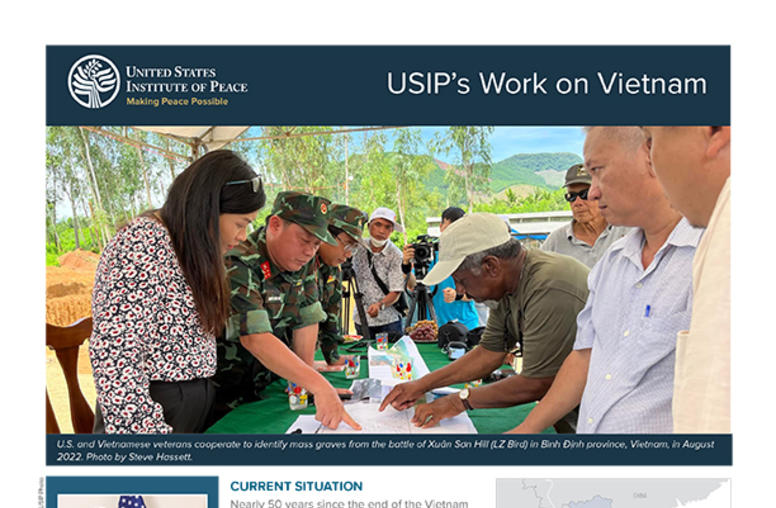Addressing the Legacies of the Vietnam War: The Next Step Forward
How a new initiative will enhance Vietnam’s wartime accounting capacity and deepen trust between the United States and Vietnam.
Read the Event CoverageIn the nearly five decades since the end of the Vietnam War, the U.S.-Vietnam relationship has traveled an extraordinary road; from enmity and conflict to an increasingly close partnership driven by shared interests and years of work to foster trust and address the enduring impacts of the war. Building on that legacy, the U.S. government will soon launch a Vietnamese Wartime Accounting Initiative following decades of Vietnamese cooperation to conduct the fullest possible accounting of missing U.S. personnel.
English
Vietnamese
To support this and other bilateral initiatives, USIP has established a new project that will promote greater dialogue both in and between the United States and Vietnam on war legacy issues and reconciliation.
On August 3, USIP hosted a discussion with U.S. and Vietnamese officials on the Vietnamese Wartime Accounting Initiative and how it fits into broader efforts to overcome legacies of war.
Continue the conversation on Twitter with #USAVietnam.
Speakers
Sen. Patrick Leahy (D-VT)
U.S. Senator; Chairman of the Senate Committee on Appropriations
Senior Lieutenant General Hoang Xuan Chien
Deputy Minister, Vietnam Ministry of National Defense
Ha Kim Ngoc
Ambassador of the Socialist Republic of Vietnam to the United States
Christopher Klein
Chargé d’Affaires, U.S. Embassy in Vietnam
Colonel Thomas Stevenson
U.S. Defense Attaché, U.S. Embassy in Hanoi
Ann Marie Yastishock
Mission Director to Vietnam, USAID
Major General Tran Quoc Dung
Chief of the Executive Office, NSC-515
Lise Grande, welcoming remarks
President and CEO, U.S. Institute of Peace
Ambassador George Moose, moderator
Vice Chair, Board of Directors, U.S. Institute of Peace
Brian Harding, moderator
Senior Expert, Southeast Asia, U.S. Institute of Peace



